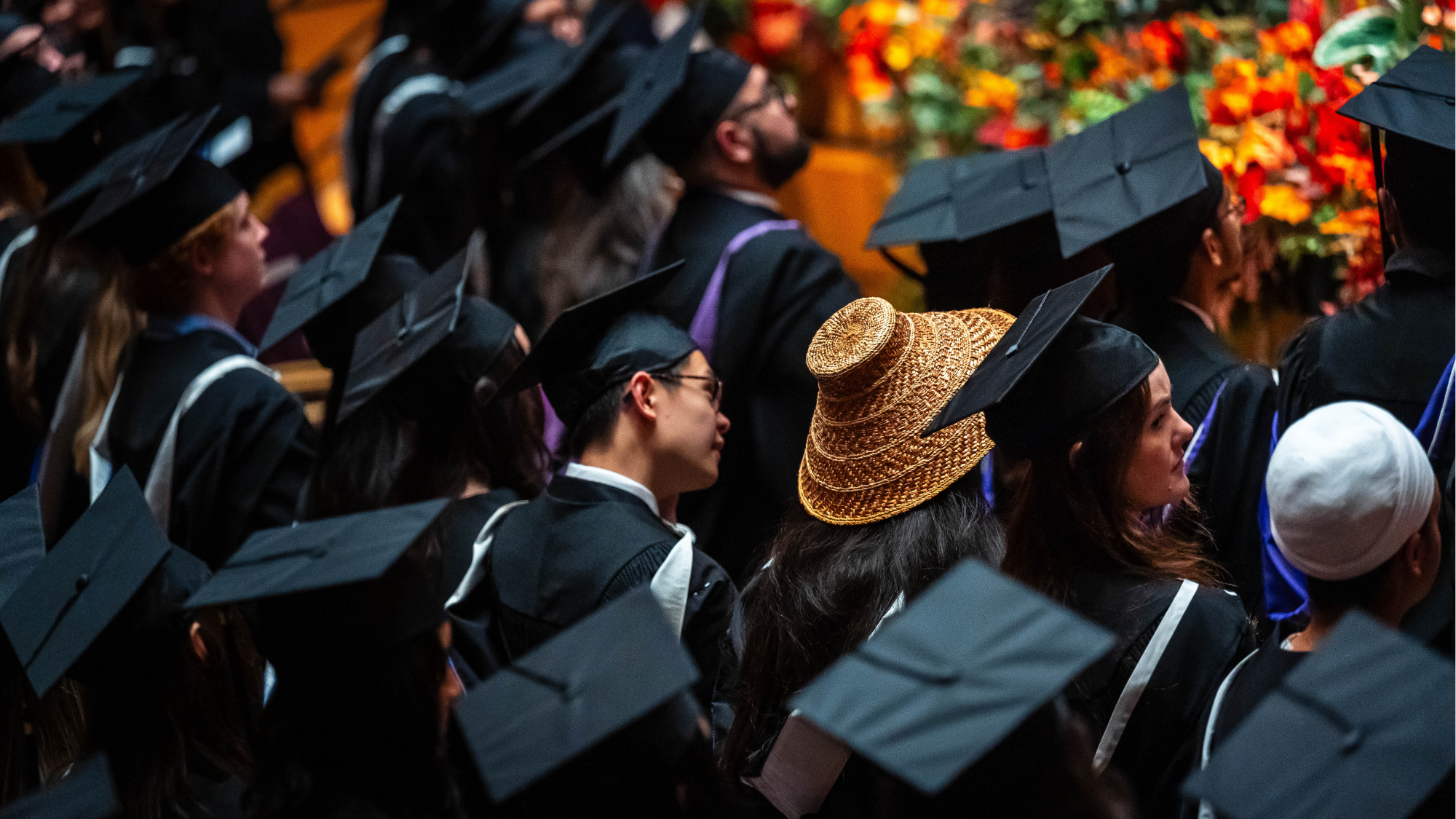

Graduates wearing caps and gowns seated at a UBC ceremony. Photo by Paul Joseph / UBC Brand & Marketing.
It begins quietly, sometimes with a curious first-year student sitting in the back row of Intro to Psych, unsure of what lies ahead.
They’re uncertain of their place in the vast world of academia and unsure how psychology will fit into their future. But as the semesters pass, that same student begins to ask bigger questions, dive deep into research, form lifelong friendships, and see the world from a new perspective.
Now, as spring convocation draws near, we invite our graduating undergraduate students to pause and reflect on their experiences. In this interview, they share their most memorable moments, the psychological concepts that reshaped how they think, the advice they’d offer to incoming students, and the excitement they feel about stepping into the next chapter of their lives.
Join us as we highlight and celebrate the voices of our incredible graduating students of the class of 2025!
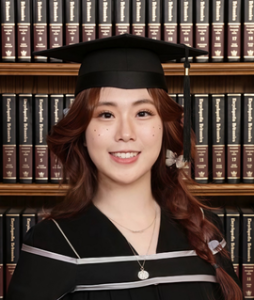

Jenny Lee
Jenny Lee (she/her)
Bachelor of Commerce & (Minor) Psychology
Jenny says that being in a support role can be challenging, especially when your own resources are limited. That’s why she has developed hobbies, like dancing, that recharge and allow her to show up for others with more presence and care. She also really enjoys research and has had the opportunity to work as a research assistant at the KID Lab. She has also learned that doing what you love, while being surrounded by a supportive community, makes all the difference.
Do you have a favourite memory or moment during your time as a psychology undergraduate student?
One of my favourite memories as a psychology undergraduate was taking Dr. Dun’s Social Psychology class, where we had the chance to run small field experiments outside of the classroom. My team and I created a social norm experiment where we gave high-fives to students who had just graduated. To our delight, other students began joining in and high-fiving as well. It was a simple but powerful way to see social contagion and norms in action.
During your time as a student, which psychological concept or theory piqued your interest—and why?
One of my favorite studies is a cultural variant of the classic marshmallow test, conducted by Yanaoka et al. (2022). It revealed that children’s ability to delay gratification is shaped not just by individual traits, but by cultural norms and habitual experiences. Interestingly, Western children were better at waiting for presents than for marshmallows, while Japanese children showed the opposite pattern—they were more willing to wait for marshmallows than for presents. This finding fascinated me because it shows how our ability to delay gratification is influenced by what our culture teaches us to value and expect, highlighting the powerful role of the environment in shaping behavior.
If you could provide incoming psychology undergraduate students with one piece of advice, what would it be?
Take digital notes during your lectures and make it a habit to review them shortly after class. Use those notes to generate flashcards and study with spaced repetition (not in order) to help consolidate your learning and memory over time. This method really helped me retain material and prepare more effectively for exams. Mindset plays a huge role too, especially embracing a growth mindset. I've learned that you can actually train your brain to enjoy difficult topics by pairing them with positive reinforcement. For example, I sometimes reward myself with a treat like dessert after tackling a tough task. This helps shift my attitude toward challenges and makes hard work feel more rewarding.
Graduating can be a thrilling—and overwhelming—time. What about this next chapter of your life are you looking forward to?
Right now, I’m working as a social media specialist at Vancouver Counselling Clinic, while also gaining frontline experience by volunteering on a crisis line and working as a behavioral interventionist. I’m looking forward to continuing to grow in these roles, building my skills, and deepening my understanding of mental health in real-world settings. I’m excited to take the next step by applying to graduate programs in Counselling Psychology, where I will deepen my skills and continue supporting others through evidence-based care.
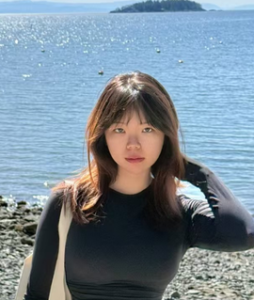

Weijun (April) Li
Weijun (April) Li (she/her)
B.A. Psychology & (Minor) Education
April’s time as a psychology student revealed her passion for counselling psychology. April states that her academic and professional experiences strengthened her empathy and commitment to supporting those with emotional and mental health struggles. She’s eager to continue learning in a professional community as she works toward becoming a psychologist.
Do you have a favourite memory or moment during your time as a psychology undergraduate student?
The most unforgettable moment during my undergraduate psychology studies was when Professor Andrew Rivers called us "fellow psychologists" in the PSYC 217 class, inspiring my passion for exploring psychology. I still remember, for me, who has just entered the field of psychology, this sense of acceptance and inclusiveness has given me a feeling of belonging as part of a big family within the psychology community. These words encouraged me and demonstrated his passion for teaching and recognition of our potential. This sense of belonging ignited my love for psychology, giving me a chance to start to view my studies and research more professionally. Since then, I have been more determined and motivated to explore the areas in psychology that I truly love.
During your time as a student, which psychological concept or theory piqued your interest—and why?
One concept that I found it really interesting is about abnormal psychology and mental illness. For instance, by learning the criteria and the symptoms of OCD and ADHD, I found it different from what I noticed on the Internet. For the people who suffer from OCD and ADHD, it is a pain and an uncontrollable disease for them, instead of the label of some presented social identity on the Internet. I feel really upset that sometimes people use others' pain to show off their uniqueness, which leads to the real patients who suffer from these illnesses being discriminated or disparaged. After learning these concepts, I realize we should pay more attention and sympathy towards those patients instead of seeing their disease as some entertainment or attention-getting labels.
If you could provide incoming psychology undergraduate students with one piece of advice, what would it be?
My advice to students about to enter an undergraduate psychology program is: explore your interests as widely as possible and, once you find a direction that truly attracts you, strive to delve deeply into it. During my study of psychology, I realized that delving into a field that one is interested in is the most important, because the motivation it generates is the key to finding one's own value and career path.Therefore, I suggest that students actively participate in various courses, seminars, and research labs, and communicate with professors. These experiences can help you clarify your interests and enable you to establish more meaningful academic and interpersonal connections. Moreover, don't be afraid to try seemingly unfamiliar areas since these unexpected fields may ignite your curiosity about a specific psychology field. The undergraduate stage is the best time for thorough exploration, so stay open and curious!
Graduating can be a thrilling—and overwhelming—time. What about this next chapter of your life are you looking forward to?
I am filled with anticipation for the upcoming graduate stage, as it represents a completely new and exciting chapter in my life. During my undergraduate years, I gradually discovered that the field of counselling psychology truly captured my interest and helped me clarify my future direction. Counselling psychology has made me realize the importance of empathy. During the process of empathizing with others, I discovered that deep down in my heart, I have a strong desire to help those clients who are suffering from various psychological and emotional disorders. Therefore, I want to use the empathy skills that I have developed through my graduate internship and practice to help more marginalized groups. During my studies, I expected that I could realize my aspiration of becoming a psychologist in a community that was filled with an academic and professional atmosphere.
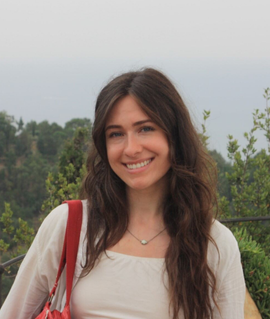

Alexanne Hall
Alexanne Hall (she/her)
B.Sc. Behavioural Neuroscience
Some of Alexanne’s favourite memories as a psychology student happened between classes—playing spikeball on MacInnes Field, studying with friends, and sharing laughs (and snowball fights) through every season. In the lab, she found her stride studying the brain, especially the neural bases of memory and behaviour. Her time in Dr. Soma’s lab brought textbook theories to life and deepened her love for neuroscience.
Do you have a favourite memory or moment during your time as a psychology undergraduate student?
Some of my fondest memories are the moments spent at MacInnes Field between classes, hanging out with classmates. On sunny days, we’d play spikeball, and in the winter, we’d sometimes have snowball fights. It was always a fun break from lectures and studying. I look back fondly at all the times I studied with my friends and roommates, as we helped one another learn and we found solidarity in our mutual struggles. I also really enjoyed my summer working in Dr. Soma’s lab with other undergraduate students and chatting through long experiments with my lab mates. In short, my favourite moments during my psychology undergraduate studies were the ones spent with other like-minded students, both the challenging times and the light-hearted ones.
During your time as a student, which psychological concept or theory piqued your interest—and why?
I was especially interested in anything related to how the brain works, such as the neural basis of memory and behaviour, as well as brain disorders and diseases. I found it fascinating to learn the science behind why we think and act the way we do. These topics were taught to us alongside the relevant scientific literature which allowed us to understand research limitations, how impressive these discoveries were, and how much more there is to learn! It was also really interesting to learn about research methods for these theories and be able to apply them in a lab setting.
If you could provide incoming psychology undergraduate students with one piece of advice, what would it be?
In terms of academics, be curious, talk concepts through with friends and get involved in research and clubs. It brings what you are learning to life and allows you to find other passionate communities. Try not to pursue a single path too early. I would highly recommend using your undergraduate degree to explore any topic that interests you outside of your chosen field. For example, I took a philosophical ethics (PHIL 333) course out of curiosity, and it was one of the most interesting courses I took during my degree and taught me new skills I had not developed in my science classes. My physiology and anatomy class (BIOL 155) was a difficult elective that required a lot of time, but I found it super interesting! Both these courses gave me new ideas for future career paths and made me a more well-rounded person and student. Similarly, try to gain work or volunteer in a variety of different fields, it will help you figure out what you like and don’t like, and you may be surprised by what you learn about yourself.
Graduating can be a thrilling—and overwhelming—time. What about this next chapter of your life are you looking forward to?
Even though I’m not sure what’s next and graduating is very bittersweet, I’m excited to bring forward the huge collection of lessons and memories from the past five years with me. Regardless of what career path I choose, I look forward to staying curious and I believe it will guide me to where I need to be. Psychology and neuroscience are always changing, and I’m looking forward to seeing where that takes me and how I can contribute to it.
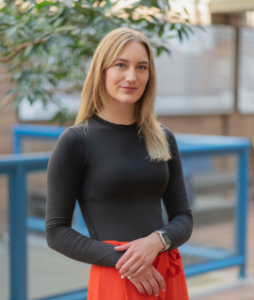

Grace Martin-Wirta
Grace Martin-Wirta (she/her)
B.A. Psychology & (Minor) Philosophy
Grace is a member of the Atikameksheng Anishnawbek First Nation, located on the Robinson-Huron Treaty territory. Her lived experience—navigating foster care, dropping out of high school, and moving between Indigenous and Eurocentric systems—have deeply shaped how she approaches education, research, and community work. Today, her research and path are focused on amplifying Indigenous and youth voices.
Do you have a favourite memory or moment during your time as a psychology undergraduate student?
One of my favourite memories included being a member of the Indigenous Psychology Students’ Association (IPSA). Not only could I connect with members of the broader PSA community, but many of my closest relations, research interests, and passions have been fostered and supported by the IPSA and its community members.
I will remember having the opportunity to become a youth worker on the xʷc̓ic̓əsəm Garden, a research assistant for the B.R.A.I.N. Lab, a peer advisor for the šxʷta:təχʷəm student space, and a member of the IPSA – learning from the spaces, places, power, and personalities that take part in my experience as an Indigenous psychology student at UBC.
I will cherish participating in the Psychology Undergraduate Research Conference, showcasing research I had been working on for the whole year, and being supported by people like Dr. Benjamin Cheung (of whom I appreciate every weekly meeting and encounter, and for showing countless opportunities to students from a wide range of backgrounds, life experiences, and interests).
During your time as a student, which psychological concept or theory piqued your interest—and why?
Experiential learning, which is basically learning by doing, has stuck with me the most! Instead of poring over lecture notes or readings, you engage with learning as an active participant. You become your own teacher. What we learn in the classroom is not just abstract theory, but from phenomena that occur in real life.
It’s almost as if it’s the human condition to figure things out, to make sense of things. Through hands-on activities, reflection, and real-world experiences, theory can connect to practice, making the learning feel more meaningful and easier to remember. This has been very evident in learning about my own Indigeneity. I have better understood who I am, what my role is, and how I can do good in the world by immersing myself in experience, not just theory.
Experiential learning shows the gaps in what we learn from the classroom: you are faced with the outliers or the not-yet-researched. It can be challenging, but revealing. Sometimes, doing helps you realize what path you are on. Other times, doing helps you to realize a path that isn’t yours to take (and that’s okay!). But learning in this way is a reminder that it’s part of being human to figure things out. That’s what you, I, and all our relations are here to do.
If you could provide incoming psychology undergraduate students with one piece of advice, what would it be?
(RE: experiential learning) If there’s one thing, it would be to understand the value of showing up, as best you can. For me, going to class was one of the biggest factors in getting the most out of the courses I took – and yes, even the ones I didn’t find too particularly interesting. It helped me understand different teaching styles, the environments I work best in, and build new connections. I found it to be more about the principle of it all, appreciating the opportunity to be educated in a beautiful place, finding another way forward for the future, and being a part of a community with the most wonderful, bright, and passionate individuals. I am not always the loudest or most extroverted in the room, but presence is powerful. The environment you’re in helps shape how you think and act, and the reverse is also true. Whether it’s school, work, culture, or LIFE, we are taking part in being future leaders – we are learning and showing how the younger ones, too, take part in tomorrow.
Graduating can be a thrilling—and overwhelming—time. What about this next chapter of your life are you looking forward to?
I’m not going straight into further schooling per se, and honestly – I’m so relieved. I will be travelling, and when I come back, I want to work and gain more experience in the fields I’m interested in.
UBC takes a lot of work! Sometimes, you need a little break and take what you’ve learned to inform the next steps. I want to pursue graduate studies, but with more purpose in my approach. I have to remind myself that I don’t need to have it all figured out (I really don’t), and because there are so many paths and opportunities and overwhelm, it’s okay to slow down. It’s okay to take a breath. How we can make life more meaningful is also by understanding our positionality in life, challenging what we think we know and what we can do, and trying to make our world a better place for future generations (this is you right now!). And if we have a little blip, that’s okay – we can try, and try, and try again.
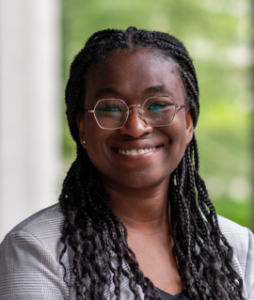

Annette Idiagbor
Annette Idiagbor (she/her)
B.A. Psychology
Annette has a strong interest in psychology, particularly in the intersection of developmental, social, and abnormal topics. She is especially curious about how the major historical events of our time will impact long-term outcomes in their generation. When she’s not diving into psychology, you’ll find her hunting down new music and growing an impressive CD collection.
Do you have a favourite memory or moment during your time as a psychology undergraduate student?
One fond memory I have is during my fourth year when I took an applied developmental course (PSYC 319 - Shoutout to Lillian May!). We were tasked with raising virtual children and really putting the curriculum to use in a real-world scenario. At that point in my degree, I had learned all about nature vs. nurtue, the influence of one’s environment, the lasting impact of early childhood experiences, and so on. And now suddenly I was (terrifyingly) supposed to put it into practice for a real person! It’s amazing how agonizing it was to decide whether little Bartholomew should start solids or have playdates or overcome his fear of dogs, and to see the outcomes not match what I expected from my choice inputs. Aside from running off with his girlfriend to get matching tattoos (not my fault), it was fun to kind of experience the unpredictability of humans as a supposed “blank slate.”
During your time as a student, which psychological concept or theory piqued your interest—and why?
I think the concept that piqued my interest the most was one that I could use and apply in my own life—the generation effect. I learned in my memory course (PSYC 333 - Shoutout Daniela Palombo!) that tests and studying which place more emphasis on active recall and production of answers allow for better retention. I feel like my prior studying technique was an even split between passively re-reading my notes and using online flashcards. The generation effect inspired me to utilize flashcards as my primary study method and work on being able to recite knowledge without external cues. And it works! I felt much more prepared going into tests once I had become comfortable making mnemonics and answering open-ended/fill-in-the-blank practice questions. This sense of confidence in having the facts also allowed for more time and brain power to be directed at deconstructing the specific test questions.
If you could provide incoming psychology undergraduate students with one piece of advice, what would it be?
Test questions are often scenario-based, so practice explaining theories to your peers and applying them to concrete examples! Psychology courses at UBC will challenge you to understand the difference between knowing facts and applying knowledge. There are sure to be simple multiple-choice questions that ask you for a fact at face value (definitions, characteristics, etc). But you might also read a scenario and be asked which theory is most/least applicable, which results would come from X theory vs Y theory, or which cognitions and behaviors belong to a school of thinking. It’s definitely a learning curve at first, but as you take more psychology courses, you will gain a sense of how the tests are structured and be able to adjust your study techniques accordingly.
Graduating can be a thrilling—and overwhelming—time. What about this next chapter of your life are you looking forward to?
While I will not lie and say that I had a moment of silence for losing my UPass, it’s fun to begin moving from “full-time student” towards “full-time career.” I’m looking forward to shifting into the professional sphere, and experiencing the “aha!” moments of my education being relevant or identifiable in the work I’m doing. The job market is changing so rapidly that I’m not sure whether I should jump into grad school immediately or take a gap year to acquire more work and research experience. But either option can set me up to begin making a name for myself in the field, and be able to connect with and learn from so many prominent figures who are currently paving the way. Overwhelming is an understatement, but there’s nowhere to go but forward!


Faith Trottier
Faith Trottier (she/they)
B.A. Psychology & (Minor) First Nations and Indigenous Studies
Faith describes herself as a proud Red River Métis person, with roots in Round Prairie, Saskatchewan, and Lac Ste. On campus, she served as the first president of the Indigenous Student Society, helping lead the creation of its constitution and bylaws through student-led town halls. Outside of school, she runs Michif Designs and shares beadwork, humour, and reflections on Métis identity on TikTok as @metispotato.
Do you have a favourite memory or moment during your time as a psychology undergraduate student?
One of my favourite memories was presenting my Directed Studies research on Métis mental health at the Canadian Psychological Association Conference. It felt incredibly powerful to represent my community in a space that often overlooks Indigenous voices and to be reminded that our experiences and knowledge systems matter in psychology.
During your time as a student, which psychological concept or theory piqued your interest—and why?
I was especially drawn to Michael Chandler’s work on cultural continuity and identity. His research showed how strong cultural ties can protect Indigenous youth from mental health risks. This concept drove me to ensure I was giving my own gifts to other Indigenous Students by doing weekly beading circles in the ISS Lounge.
If you could provide incoming psychology undergraduate students with one piece of advice, what would it be?
Find your people. Whether it's through student groups, research opportunities, or just folks who get what you're going through, community makes a huge difference. Don’t be afraid to ask questions, explore your interests, and take up space.
Graduating can be a thrilling—and overwhelming—time. What about this next chapter of your life are you looking forward to?
I’m heading to the University of Manitoba for my Master of Social Work in Indigenous Knowledges. I’m excited to continue learning and eventually contribute to Indigenous mental health in a deeper, more community-rooted way.
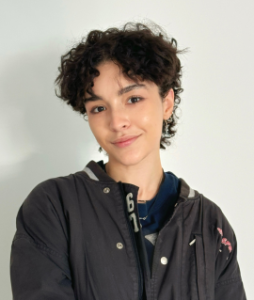

Fiona Averill
Fiona Averill (she/her)
B.A. (Hons) Psychology
At the crossroads of language, brain science, and culture, Fiona explores how kids grow up bilingual and how culture shapes connection. Throughout my degree, I’ve been involved in research at the MAGIC Lab and currently work in both the Infant Studies Centre and the PANGEA Lab. When she’s not in the lab, she’s active in community organizing and event planning with a focus on inclusivity and creative expression. She also does art on the side.
Do you have a favourite memory or moment during your time as a psychology undergraduate student?
One of my most memorable moments was presenting my honours independent research project at PURC this year. I’m usually pretty comfortable with public speaking, but I was surprisingly nervous. Still, I was excited to share something important to me, and it felt like a meaningful culmination of my undergraduate journey.
During your time as a student, which psychological concept or theory piqued your interest—and why?
As someone interested in cultural psychology, I was particularly struck by the concept of cultural misattribution bias—the tendency to overemphasize cultural explanations when interpreting the behavior of minority individuals, while downplaying the role culture plays in relation to white individuals. This has been documented in psychology, with research showing that scholars are more likely to approve of all-minority samples for studying culture, and all-white samples for studying individual psychology. This reinforces the idea that white individuals are viewed as a "neutral" norm, while others are defined by their cultural background. Learning about this bias challenged me to think more critically about how we frame culture in research and highlighted the importance of examining our own assumptions.
If you could provide incoming psychology undergraduate students with one piece of advice, what would it be?
Get involved in research! It might sound cliché, but I wish someone had emphasized just how valuable it is early on. I didn’t properly start until my third year, but I’m so glad I did—it’s been incredibly enriching and has helped me discover my true passions. It doesn’t need to be the sole focus of your undergrad experience (also join clubs and have a social life, please), but it’s been the best way for me to open doors and find meaningful opportunities!
Graduating can be a thrilling—and overwhelming—time. What about this next chapter of your life are you looking forward to?
The fact that I’m graduating hasn’t entirely sunk in yet, but I’m looking forward to taking a gap year to work, travel, and explore before diving back into school!
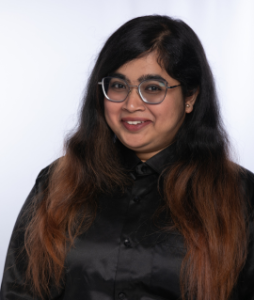

Dristhi
Drishti Datta (she/her)
B.A. (Hons) Psychology
Drishti’s undergraduate research focused on how people interpret gaze shifts, reactions to repetitive movements (misokinesia), and adapting communication without visual cues. These studies sparked her ongoing curiosity about social perception and subtle communication.
Do you have a favourite memory or moment during your time as a psychology undergraduate student?
One of my favourite moments as a psych undergrad was when our group won the PSYC 217 Best Poster Award. It gave us the chance to present at the Psychology Undergraduate Research Conference, as second-year students, which felt huge at the time. Since I was hoping to join the Honours program, getting to present alongside Honours students and researchers felt like a real step toward that goal. It was such an exciting and intellectually stimulating experience, and it really confirmed how much I enjoy being part of the research community.
During your time as a student, which psychological concept or theory piqued your interest—and why?
In PSYC 309, something that really stuck with me was learning that losing the ability to understand sarcasm can actually be an early sign of cognitive decline. I found that so interesting because sarcasm isn’t just about language, it involves picking up on tone, context, and social cues, which are all tied to executive functioning. It made me realize how small changes in the way someone interacts socially can reflect much deeper cognitive changes, even before memory loss becomes noticeable. It definitely changed the way I think about neurocognitive health.
If you could provide incoming psychology undergraduate students with one piece of advice, what would it be?
I’d say don’t feel pressured to compare yourself to others, whether it’s about grades, research experience, or extracurriculars. Everyone’s figuring things out at their own pace, and there’s no one right path through university. Some people dive into research early, others find their passion later and it’s all valid. Try different things, explore what genuinely interests you, and pay attention to what feels right for you, not what looks impressive on paper. Honestly, the more you lean into what excites you, the clearer your direction becomes. Just do you.
Graduating can be a thrilling—and overwhelming—time. What about this next chapter of your life are you looking forward to?
I’m really looking forward to continuing to do more research and finding ways to apply it to help people in meaningful ways. I’ve loved the process of asking questions, digging into data, and seeing how insights from psychology can actually make a difference in real life. So for me, this next chapter is about figuring out the best path to keep doing that, whether it’s through grad school, new projects, or collaborations. I’m excited to explore where that can lead.
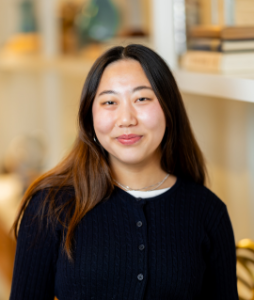

Dabeen Hyun
Dabeen Hyun (she/her)
B.A. Psychology
Dabeen is a research assistant at Dr. Nancy Sin’s UPLIFT Health Lab, and has served as a global ambassador and orientation leader for Go Global, a senior volunteer at UBC Sprouts, and a singer with UBC A Cappella. Passionate about building community and supporting student well-being, she also enjoys running, pilates, and making matcha lattes in her free time.
Do you have a favourite memory or moment during your time as a psychology undergraduate student?
I’m lucky to have so many to choose from — over the last four years, I’ve been privileged to learn from passionate and inspiring professors, gain exposure to meaningful research, and build friendships that will last well beyond graduation. One memory that stands out is the UPLIFT Health Lab social, where we reflected on the year’s accomplishments over a beach picnic. Getting involved as an RA at UPLIFT has been a defining part of my time as a psychology student. The mentorship and guidance from Dr. Nancy Sin, grad students, Nikki and Lydia, and our lab manager, Kyra shaped my academic and personal growth. I got to co-lead a journal club and serve on the EDI committee, and our grad students hosted insightful workshops on conferences, writing CVs, and grad school applications. This memory reminded me just how welcoming and supportive the UPLIFT team, and the wider UBC Psychology community, truly are.
During your time as a student, which psychological concept or theory piqued your interest—and why?
One of my favourite classes at UBC was PSYC 309: Cognitive Processes with Dr. Todd Handy. The course as a whole was so interesting, but I was particularly fascinated by social biases in cognition (i.e., how others bias our thinking; our own cognitive biases when thinking about others and how they perceive us). I really enjoyed learning about the Liking Gap and Thought Gap which describe how we tend to underestimate how much others like us and think about us, respectively. Once I became aware that these tendencies exist, I started noticing them in my everyday interactions and even professional settings. Understanding the underlying issues in social interactions helped me shift my perception and behavior to be more self-assured when talking to new people, most notably in academic and networking spaces.
If you could provide incoming psychology undergraduate students with one piece of advice, what would it be?
Don’t let the fear of failure stop you from trying. Early in my degree, I held myself back from trying new things because I was afraid of not being good at something right away. That changed when I shifted my goals from needing perfection to learning as much as possible. I lived by the motto: “Do it scared.” PSYC 218, for example, seemed so intimidating because I didn’t see math as my strength, but it became one of the most rewarding courses of my undergrad. Thanks to the support of the amazing TAs and Dr. Jason Rights, who patiently answered all of my questions in countless office hours, I genuinely enjoyed the learning process. Outside the classroom, stepping out of my comfort zone led me to diverse, incredible experiences at UBC Sprouts, West Coast Kids Cancer Foundation, UBC A Cappella, and Go Global. Growth starts with showing up, even if you’re scared!
Graduating can be a thrilling—and overwhelming—time. What about this next chapter of your life are you looking forward to?
I’m excited to use this next chapter as a meaningful breathing space to reflect, explore, and gain clarity on what I want to pursue long-term. As an international student, I’m especially grateful for the PGWP, and I plan to make the most of it by gaining full-time work experience over the next year. I’m thrilled to be continuing as a research assistant with UPLIFT Health Lab, which allows me to refine my practical research skills while staying closely connected to UBC and keep learning in a setting I love. Beyond that, I’m looking forward to having the time and space to thoughtfully prepare my applications for the 2026 grad school admissions cycle. The next chapter is a time of exploration, growth, and laying a strong foundation for what’s next, and I’m looking forward to seeing where it leads.
“Don’t let the fear of failure stop you from trying. Early in my degree, I held myself back from trying new things because I was afraid of not being good at something right away. That changed when I shifted my goals from needing perfection to learning as much as possible.”
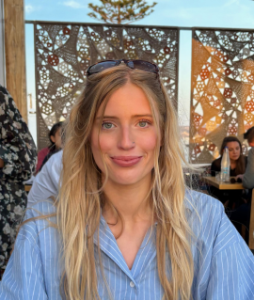

Brooke Aikins
Brooke Aikins (she/her)
B.A. Psychology
Brooke spent much of her undergraduate journey immersed in research. Working as a research assistant allowed her to apply what she learned in class to real-world questions, sharpen her critical thinking, and build meaningful relationships with professors and peers. Through these experiences, she discovered a love for exploring the many directions psychology can take and developed a deeper sense of purpose and confidence in her academic path.
If you could provide incoming psychology undergraduate students with one piece of advice, what would it be?
Get involved in research, even if you’re unsure about grad school. Being a research assistant helped me apply classroom learnings to real-life situations, build relationships with professors, and discover what I enjoy about psychology. Psychology can lead you down many different paths, and working in research can help clarify and refine your interests.
As a research assistant, you have a unique chance to develop existing skills in a new context while also learning new ones. You can leverage the access you have to peers and mentors to take initiative and grow. Research challenges you to use critical thinking and leadership skills in ways that go beyond the classroom.
At UBC, there is the wonderful benefit of making lasting connections with incredible professors, students, and faculty who can help you make the most of your undergraduate experience.
Inspired by our graduating Class of 2025? Share their stories and follow our social media channels for more student highlights!


